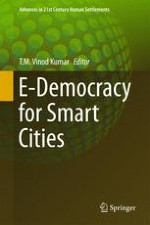Abstract
In broad context, e-Governance is a functional subsystem under e-Democracy, since Governance and hence, entire Government itself is an important section of democracy itself. Hence, smart city development is in fact, the transformation of approach in their futuristic contexts towards responsibilities, interests and rights of all its stakeholders; such as citizens, government, administration, services, utilities, etc. Globally, consistent focus for financial growth and quality of life has ultimately resulted into unprecedented rise in consumption of electrical energy. Electrical power management in India has become a critical issue with rising population, increasing life expectancy, economic growth and, more importantly, due to vibrantly changing and difficult to predict weather. Electrical power supply has always been a resource in deep scarcity in India, so 24 * 7 electricity is an issue causing concern. Efficient decision-making at different levels rely upon reliable availability of electricity, which has been an integral element of citizens’ life, therefore stable and sustainable power management, especially supply reliability is a need of today. Government of India has launched a Smart City Mission for building 100 Smart Cities, in which 24 × 7 availability of electricity has been one of the major focus. Historically, electricity generation, transmission and distribution decisions have been the exclusive domain of utility companies, domain experts, bureaucrats or sometimes political interventions, but now a paradigm shift could be observed towards citizens’ participation and active involvement. Sufficient electricity being the mandatory element of a smart city necessitates an inclusive and participatory management of this resource. Smart electricity management in upcoming smart cities encounters challenges in the urban electricity management through smart grid via integration of ICT and e-Democracy. Smart Grid as an energy backbone of smart city is immensely vital and serving at the core of Smart City realization. Evolving e-Democracy, smart grid includes highly interactive participation of citizens in energy consumption domain, based on humanitarian and customer centric approach. Different types of prosumers (producers + consumers), their different energy requirements at different timings, different types of energy resources and their switching feasibilities considering different aspects have been integrated. Under National Smart Grid Mission, Government of India has launched Restructured Accelerated Power Development and Reforms Programme for funding Smart Grid initiatives and Gujarat has been one of the leading states of India as far as self-reliance and reforms like solar city, smart grid, etc. are concerned. Renewable Power Plants and Smart Grid Pilot Projects implemented in Gujarat have been proved models and case studies for other locations. Moving ahead from our earlier contributed chapter “E-Governance for Photovoltaic Powergrid: Solar City Gandhinagar, Gujarat, India”, in the book E-Governance of Smart Cities, in this chapter, we now present citizen-centric approach of design-implementation of smart grid with case study of pilot project at Naroda, Ahmedabad.
